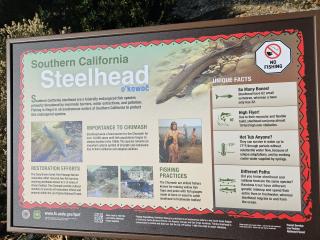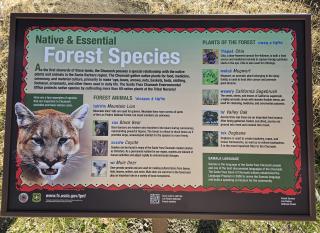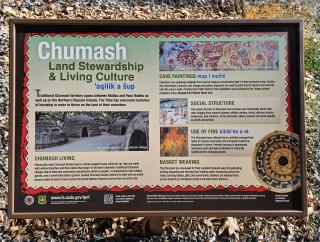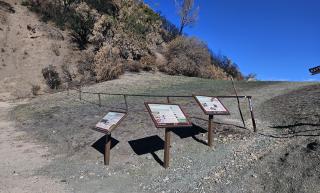Los Padres, Chumash Tribe partnership shares ancestral knowledge with visitors
CALIFORNIA — Los Padres National Forest staff installed educational signs at five recreation sites on the Santa Lucia Ranger District through a partnership with the Santa Ynez Band of Chumash Indians whose ancestral lands comprise much of National Forest Service land along California’s Central Coast.
The signs were designed in collaboration with the Chumash Tribal Council with assistance from Forest Service graphic design specialists. This ensured the tribe’s concerns were met while ensuring adhere to agency publishing standards. Each sign centers on two themes: sharing traditional Chumash ancestral knowledge and providing information on endangered species and how to protect them.
This signage will educate visitors on the Native American Chumash history of the forest and the tribe’s traditional practices. The new signs are located within the burn scar of the massive 2007 Zaca Fire.
“We truly value working with our local tribal partners to educate the public about the history of the area they are visiting and cultural practices of the original inhabitants of the forest,” said Santa Lucia District Ranger Ben Gray. “The Chumash tribal elders were instrumental in getting this project off the ground and in shaping the messaging in each of the panels.”
All three of the signs were installed at Davy Brown and Nira campgrounds, and at the Lower Manzanita and Upper Davy Brown trailheads. The Cachuma Saddle/McKinley trailhead has only two signs to avoid overcrowding the site and its limited available space. This project also funded the relocation of the Upper Davy Brown trailhead sign-in/registry box to an area adjacent to the new signs.
This project directly addresses Los Padres’ commitment to develop educational and engagement opportunities to illustrate the natural and cultural history on NFS lands. The signs will promote a greater awareness of ancestral Chumash practices while providing further education around steelhead trout and current efforts to protect this endangered species and restore tributaries in its native habitat.
Funding for the project was secured through a generous grant from the National Fish and Wildlife Foundation.
The non-profit environmental group Blue Tomorrow worked with the Chumash on logistics, design and messaging aspects of this project.




